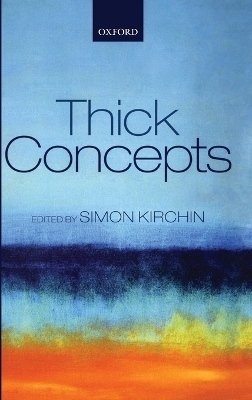
Thick Concepts
Oxford University Press (Verlag)
978-0-19-967234-9 (ISBN)
What is the difference between judging someone to be good and judging them to be kind? Both judgements are typically positive, but the latter seems to offer more description of the person: we get a more specific sense of what they are like. Very general evaluative concepts (such as good, bad, right and wrong) are referred to as thin concepts, whilst more specific ones (including brave, rude, gracious, wicked, sympathetic, and mean) are termed thick concepts. In this volume, an international team of experts addresses the questions that this distinction opens up. How do the descriptive and evaluative functions or elements of thick concepts combine with each other? Are these functions or elements separable in the first place? Is there a sharp division between thin and thick concepts? Can we mark interesting further distinctions between how thick ethical concepts work and how other thick concepts work, such as those found in aesthetics and epistemology? How, if at all, are thick concepts related to reasons and action? These questions, and others, touch on some of the deepest philosophical issues about the evaluative and normative. They force us to think hard about the place of the evaluative in a (seemingly) nonevaluative world, and raise fascinating issues about how language works.
Simon Kirchin is Senior Lecturer in Philosophy at the University of Kent. He is the author of Metaethics (Palgrave, 2012), and the editor of Arguing about Metaethics (with Andrew Fisher; Routledge, 2006), and A World without Values: Essays on John Mackie's Moral Error Theory (with Richard Joyce' Springer, 2009). He is currently writing a book about thick and thin concepts.
1. Introduction: Thick and Thin Concepts ; 2. Thick Concepts, Analysis, and Reductionism ; 3. Practical Concepts ; 4. Thick Concepts and Thick Descriptions ; 5. It's Evaluation, only Thicker ; 6. On the Nature and Significance of the Distinction between Thick and Thin Ethical Concepts ; 7. Disentangling Disentangling ; 8. Thick Concepts and Underdetermination ; 9. Evaluative Language and Evaluative Reality ; 10. There are no Thin Concepts ; 11. Moral Metaphor and Thick Concepts: what Moral Philosophy can Learn from Aesthetics ; 12. Williams on Thick Ethical Concepts and Reasons for Action ; 13. Well-being, Wisdom, and Thick Theorizing: on the Division of Labor between Moral Philosophy and Positive Psychology ; Index
| Reihe/Serie | Mind Association Occasional Series |
|---|---|
| Verlagsort | Oxford |
| Sprache | englisch |
| Maße | 162 x 241 mm |
| Gewicht | 532 g |
| Themenwelt | Geisteswissenschaften ► Philosophie ► Ethik |
| Geisteswissenschaften ► Philosophie ► Sprachphilosophie | |
| ISBN-10 | 0-19-967234-2 / 0199672342 |
| ISBN-13 | 978-0-19-967234-9 / 9780199672349 |
| Zustand | Neuware |
| Haben Sie eine Frage zum Produkt? |
aus dem Bereich


